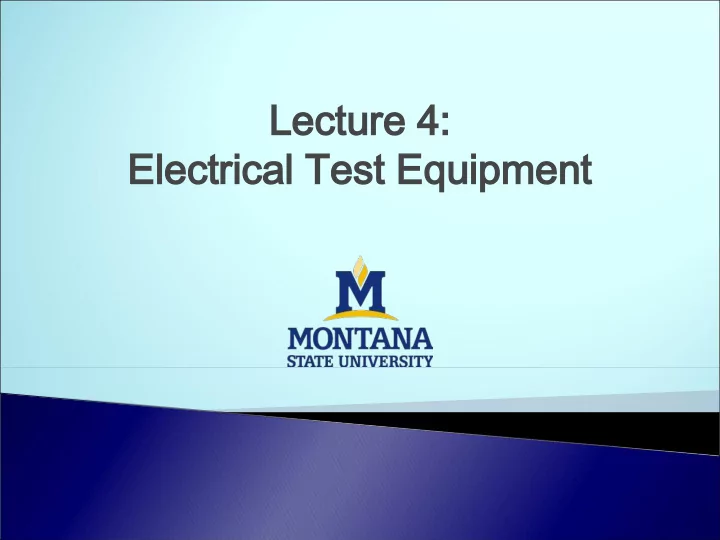

Lectur Lecture 4: e 4: Electr Electrical Test Equipm ical Test Equipment ent
Recall Fr Recall From om Lectur Lecture 3 e 3 Electrical Power: P I E
Recall Fr Recall From om Lectur Lecture 3 cont'd e 3 cont'd Electrical Power: PIRE wheel All you REALLY need to remember: E = I R – P = I E – – algebra
Recall Fr Recall From om Lectur Lecture 3 cont'd e 3 cont'd • Relationship with Power Energy = ∫ P T dT – If Power not constant with time – If Power constant Energy = PT • System Efficiency:
Recall Fr Recall From om Lectur Lecture 3 cont'd e 3 cont'd Mechanical Power: • Equation considering SI units: Angular speed (radians/s) P = Torque (N-m) Power (W) • Equation given in book:
Im Impor portant! tant! SI Units vs. US Customary Units: • Be able to convert between units of measure. – For tests: Do not need to know conversion factors – For future work: Be familiar with conversion factors. • E.g. 1 hp ~= 750 Watts • Know the SI-based equations: – These are more fundamental – For tests: Need to know these equations. • E.g. P = – For future work: Understand these equations.
Electr Electrical Test Equipm ical Test Equipment ent • Example test equipment – Digital Multimeters (DMMs) – Voltage Testers • Reduced operation from DMM – Current Testers • Clamp-on Ammeters – Megohmmeter • Measure large resistances (e.g. insulation) – Power Analyzer • Measure real and reactive power – Oscilloscope • Mostly test-bench • Most informative
Digital M Digital Multim ultimeter eter • Generally can measure – AC and DC voltage – AC and DC current – Resistance – Connectivity • Important for Correct Usage: – Multiple terminals
Voltage Tester Voltage Testers Non-contact – Find live circuits – Generally for safety Contact – Reduced Operation from DMM – Generally measure AC and DC voltages – Ballpark measurements!
Am Ammeter eters • Contact Meters – Like the function on the DMM – Not as useful in the field • Non-contact Meters (Clamp-On) – No need to break circuit – Senses current by induction – Measures TOTAL current
Megohm egohmmeter eter • Measures very large resistances – Into the range G – Requires large voltage source 500 to 1000 V – Useful for testing insulations
Oscilloscope Oscilloscope • Allows “view” of electrical signals • Gives most information • See demonstration
Recommend
More recommend